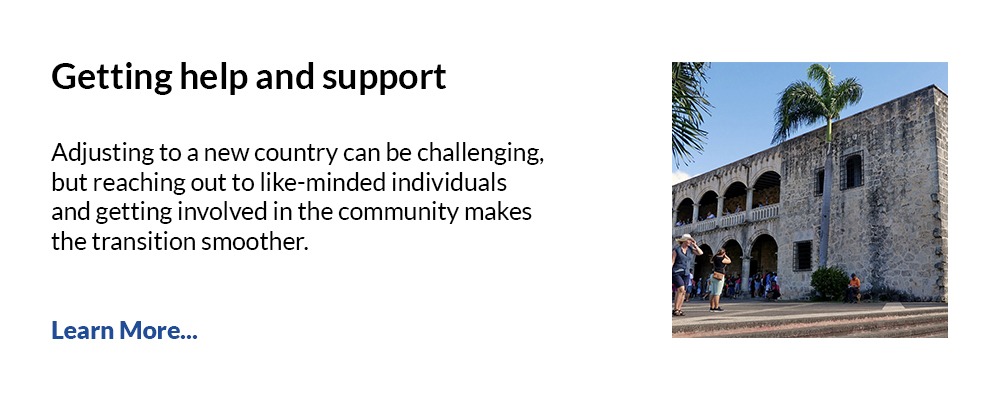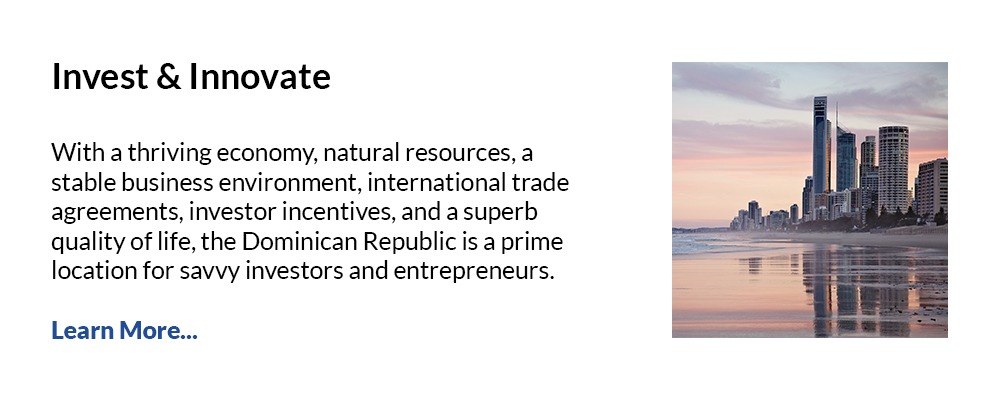Business Environment
The Dominican Republic has five basic pillars: tourism, free trade zone, manufacturing, agriculture, real estate development and mining. All of them depend on the American and European economies. During the administration of President Medina, the country has experienced a steady growth, the financing of small agricultural producers has been encouraged, allowing them to modernize, adding value to their production. This program helped hundreds of small producers throughout the country, and favored better budgetary control of the government.
Imports from the Dominican Republic have increased over the past five years, partly as a result of the Dominican Republic Free Trade Agreement, Central America and the United States of America (TLC). In relation to exports, most comes from free trade zones and the mining sector, with agriculture being a fundamental pillar.
Commercial legislation has significantly improved in the Dominican Republic in various aspects: customs procedures, tax information, and banking supervision. It is advised that any company that seeks to enter the Dominican Republic market get legal advice before signing any formal agreement with a local interlocutor, whether private or public.
If you need any kind of advice regarding investments in the Dominican Republic, you can contact us, we will gladly assist you.
We can provide collaborators who have extensive experience and knowledge about it.
Elementos clave del 2008
Inicio de un negocio: La República Dominicana redujo el tiempo necesario para comenzar un negocio. Para ello simplificó el registro del nombre e introdujo el registro impositivo online.
Registro de la propiedad: Se facilitó el registro de la propiedad al adoptar diversas leyes que simplificaron el proceso.
Pago de impuestos: Las obligaciones fiscales incrementaron su coste al aumentar la tasa de contribución a la seguridad social que realizan los empleadores.
Comercio transfronterizo: Se facilitó al reducir los documentos necesarios.
Elementos clave del 2009
Inicio de un negocio: La República Dominicana facilitó y redujo el coste el inicio de un negocio, creando para ello un servicio online que permite completar los trámites de registro y reduciendo los impuestos de incorporación.
Registro de la propiedad: Se redujo el coste y se simplificaron los impuestos recaudados por transacciones de propiedades.
Pago de impuestos: Se redujo el coste de las obligaciones fiscales, a la par que se simplificaron los procesos, reduciendo el impuesto de sociedades, eliminando algunos impuestos como el impuesto de actos jurídicos documentados, e implementando de forma totalmente online la declaración y pago, usada ahora por la mayoría de los contribuyentes.
Comercio transfronterizo: Se redujo el tiempo de exportación e importación mediante mejoras del portal online para la gestión de los documentos aduaneros, en las inspecciones de riesgos y en el sector bancario.
Elementos clave del 2010
Protección de los inversores minoritarios: La República Dominicana fortaleció la protección de los inversores a través de una nueva ley empresarial que obliga a divulgar más información corporativa, establece la responsabilidad del director, y garantiza el acceso a la información a los accionistas.
Elementos clave del 2011
Inicio de un negocio: La República Dominicana hizo más difícil el comenzar un negocio al establecer un capital mínimo de 100.000 pesos dominicanos (2.855 dólares) para un nuevo tipo de empresa, la sociedad de responsabilidad limitada.
Elementos clave del 2012
Inicio de un negocio: Se facilitó el establecimiento de una nueva empresa al eliminar el requisito de aportar una prueba de haber depositado capital.
Elementos clave del 2013
Pago de impuestos: Se incrementa el impuesto de sociedades.
Elementos clave del 2015
Solicitud de permisos de construcción: La República Dominicana encareció los permisos de construcción al aumentar las tasas.
Obtención de créditos: Se mejora el sistema de información crediticia al promulgar una nueva ley reguladora de la protección de la información personal y la operación de las instituciones de información de crédito.
Protección de los inversores minoritarios: Se fortalece la protección a los inversores minoritarios introduciendo mayores derechos de los accionistas y requisitos para una mayor transparencia corporativa.
Comercio transfronterizo: Se reducen el número de documentos necesarios para la importación y exportación, haciendo los trámites más sencillos.
Elementos clave del 2017
Obtención de suministro eléctrico: Se acelera la obtención de suministro eléctrico al reducir el tiempo necesario para que se aprueben los proyectos de conexión eléctrica.
Pago de impuestos: Se reduce el impuesto de sociedades.
Ley contra el blanqueo de capitales (ley 155-17): La nueva ley, reformada en 2017, trata de regular las actividades de blanqueo de capitales según las últimas directrices internacionales, cumpliendo los estándares internacionales de transparencia.
Elementos clave del 2018
Inicio un negocio: Se reduce el tiempo necesario para registrar una empresa al simplificar los procesos en la Cámara de Comercio a través del portal formalizate.gob.do
Obtención de suministro eléctrico: Se ha mejorado la red eléctrica gracias a una expansión de la misma, un rediseño de la división zonal y establecimiento de un equipo de restauración del suministro para atender los cortes.
Pago de impuestos: Se eleva el coste de las obligaciones fiscales al disminuir la tasa de inflación.
Resolución de la insolvencia: Se facilita la solución en situaciones de insolvencia al adoptar una ley que introduce el proceso reorganizativo y facilita la continuación del negocio del deudor durante los procedimientos de insolvencia. La nueva ley permite a los acreedores tener una mayor participación en decisiones importantes sobre los procedimientos de insolvencia.
Regulación del mercado laboral: Se incrementa el tiempo remunerado de baja por maternidad.
The AFP´s: The Pension Fund Administrators (AFPs) are public limited companies that have the objective of administering a pension fund and granting their members the benefits established by law. They are financed through the collection of commissions from their affiliates and may increase their savings through investments.
However, it is good to keep in mind that in the whole world the pension systems and their reforms are in a state of continuous evolution motivated by changes in care, by changing reform needs and by modifications of the environment, which are a reflection of circumstances objective and the evolution of points of view and perceptions. The current global financial crisis and the adjustment to a new situation of normality still uncertain will make future pension systems different from the previous ones.
In the Dominican Republic, the Pension Fund Administrators, known by its acronym as AFP, are specialized entities and legally authorized to perform the function of managing the savings for workers’ pensions and managing the payment of benefits and benefits that the Law establishes. This pension fund administrator is a financial company, whose main objective is to manage the personal accounts of the affiliated workers and grant them a pension when they end their working life, whether due to retirement, disability, old age or occupational accident.
¿What is AFI?: An investment fund is an association destined to gather contributions from a group of natural or legal persons (investors and / or contributors) to form a common heritage, it must be regulated by a higher body as a superintendence, which is a regulatory body that ensures the state in investor protection, it can be said that it is a more or less simple way to ensure an optimal return on the savings of an investor, this will be managed by a third party, which must be qualified as a qualified connoisseur or an expert, has the advantage that allows investors to have access to various asset portfolios, which if done individually is risky since access is probably limited and even without the possibility of accessing the market.
Each fund is made up of a group of assets that can be from:
- Bonds
- Actions
- Properties
- Deposit Certificates and others
According to the type of asset that integrates it, they are classified as:
- Fixed income assets
- Equity assets
- Real Estate
- Fixed Term among others
The Funds are designed according to each profile of investors depending on the level of risk that the investor is willing to assume
In general, the funds do not guarantee the performance of the funds, they depend on market behavior.
Said common equity would simultaneously invest in several assets such as bonds, stocks, time deposits, real estate, and any other instrument that the law allows. The combination of several of these assets is what is called an investment portfolio.
The Investment Funds Administrator is that third expert, who, following established guidelines and procedures, will be in charge of the management and administration of the investment portfolio, seeking to obtain the highest profitability, observing the risk levels and controlling the costs generated to the fund , following the guidelines established in the Prospectus and in the Fund’s Investment Regulations.
The investment fund is divided into equal parts called participation fees, the fees reflect the net value of all the assets that make up the fund. Each installment includes a proportion of the different assets that make up the fund. Each investor can buy more or less installments depending on the money he contributes. The value of the fee is variable, that is, it can increase or decrease daily due to fluctuations in the prices of the instruments that make up the fund’s investment portfolio. These fluctuations in the value of the quota could positively or negatively affect your investment.
The returns obtained in the management of the fund are distributed proportionally among all the quotas that comprise it. In this way, contributors see the fruits of management without having to spend time following the behavior of financial markets, nor having to make decisions as to the type of assets in which to invest.
First position of AFI in the Dominican Republic: The Administrator of Popular Investment Funds (AFI Popular) is a subsidiary of Grupo Popular S.A., a financial group with more than 40 years in the Dominican Republic and which is a majority shareholder of the Company. We invite you to learn more about the Popular Group, its history, philosophy, and its contributions to the community through the website www.popularenlinea.com.do, in the section about us.
In AFI Popular, funds are offered for each investor profile. Those who seek greater profitability should assume a higher level of risk. Each investment fund has an information leaflet and Internal Regulation available to the investing public, which stipulates the conditions of its operation, including the investment policy, which in turn determines the level of risk implicit in each product.
¿What is a Trust ?: The trust is a legal act, of trust, in which a person gives to another the ownership of some assets for the latter to administer for the benefit of a third party.
Definition of Trust: The trust contract is defined as the Legal business by virtue of which a person called a trustee transfers to another person named – trustee – as trust, one or more assets (which form the trust estate) for that at the expiration of a term or the fulfillment of a condition, it transmits the purpose or the result established by the former, in its favor or in favor of a third party called beneficiary or trustee.
What are an asset, liability and equity: Asset, liability and equity are the components of the balance sheet. Definition is these basic elements of accounting.
Active:
In accounting, the total resources available to the company to carry out its operations are named; Represents all assets and rights that are owned by the business.
Passive:
In accounting, the total debts and obligations contracted by the company, or business charge, are referred to as such.
Equity: (Stockholders’ equity)
This expression is used in accounting to refer to the sum of the contributions of the owners modified by the operating results of the company; It is the capital stock plus profits or less losses.
Intervening parties
Four parties are identified within the trust agreement:
A.- Trustee or trustor: It is who constitutes the trust, transferring ownership of the property or assets to the trustee. to fulfill the specific purpose of the trust.
B.- Fiduciary: In general, anyone can be. Therefore they can be natural or legal persons, public or private, national or foreign. etc. However, in the case of the financial trust, only financial entities subject to the respective law or legal entities expressly authorized for that purpose may offer their services as fiduciaries.
C.- Beneficiary: It is the one in whose favor the administration of the trust assets is exercised. It can be a natural or legal person that may not exist at the time of the contract or testament, as long as the data that allow its future individualization are recorded. More than one beneficiary and substitute beneficiaries may be appointed. If the beneficiary does not exist, does not accept, or waives, the beneficiary will be the trustee and failing that it will be the trustee.
D.- Trustee: It is he who receives the trust property once the trust is extinguished for compliance with the term or condition.
Advantages
Depending on the type of trust and the agreed clauses, certain advantages are obtained, then some that usually apply to all or most of the trust contracts:
- Managed assets are unattachable.
- Accounting and independent audits.
- Tax benefits.
- It can be used for the realization of unlimited purposes, as long as they are lawful.
There are four factors that explain the development of the trust:
1.- Commercial approach of the figure of the Trust: A figure that in its conceptual foundations is presented as a legal contract, transcends this discipline to become a commercial business and especially a banking business due to the importance that banks have granted to it as a business generating source. This means that the Trust has been put at the service of bank customers so that they can conduct new business using the advantages and versatility it offers.
2.- Purpose to be fulfilled: The second factor is that every trust necessarily implies an objective, that is, that every trust is made for something and for something. In a world where so many things start and not all of them come to an end, to believe that a business that has been proposed is carried out in the most faithful manner as it has been entrusted to a fiduciary, is a guarantee that instead of limit the possibilities of its development, it stimulates it and gives it a renewal impulse.
3.- Autonomous patrimony: The formation of an autonomous patrimony or of affectation constitutes one of the most outstanding elements of the trust, which allows that the resources put in trust are not confused accounting or juridically with those of the fiduciary itself, nor even with other resources trusts that he might have under his administration. The establishment of as many autonomous assets as trusts managed by a fiduciary, breaks with the classic principle of civil law referring to “one person, an estate” and gives the possibility that multiple businesses can be carried out with them.
4.- Elasticity of the figure: Finally, the enormous flexibility presented by the trust figure allows multiple businesses to be carried out according to the needs of the clients.
Most important trusts registered in RD
| 1 | CCI TRUST S.A. |
| 2 | SOCIEDAD FIDUCIARIA GLOBAL S.A. |
| 3 | FIDUCORP SERVICIOS FIDUCIARIOS CORPORATIVOS S.A. |
| 4 | FIDUCIARIA BHD S.A. |
| 5 | PARTNERS FIDUCIARIOS S.A. |
| 6 | FIDUCIARIA UNIVERSAL S.A. |
| 7 | IN COMMENDAM S.A. |
| 8 | FIDUCIARIA POPULAR S.A. |
| 9 | FIDUCIARIA RESERVAS S.A. |
| 10 | DAF PARTNERS S.A. |
| 11 | JMMB SOCIEDAD FIDUCIARIA S.A. |
| 12 | PARALLAX FIDUCIA S.A. |
| 13 | DINAMIS TRUSTEE DT S.A. |
| 14 | FIDUCIARIA BANTRUST, S.A. |
| 15 | FIDUCIARIA SCOTIABANK S.A. |
| 16 | FIDUCIARIA LA NACIONAL S.A. |
| 17 | FIDUCIARIA OMG S.A. |
| 18 | FIDUCIARIA ADVANCED TRUSTEE SERVICES S.A. |
| 19 | FIDUCIARIA FIVAL, S.A. |
| 20 | FIDUCIARIA FENIX S.A. |
| 21 | MS FIDUCIAMS S.A. |
| 22 | VERTEX FIDUCIA S.A. |
| 23 | FIDUCIARIA TIVALS.A. S.A. |
| 24 | FIDUCIARIA DOMINICANA FIDOM S.A. |
| 25 | ASOCIACION POPULAR DE AHORROS Y PRESTAMOS |
FIDUCIARIA UNIVERSAL:
The incorporation of Universal Fiduciary to the Universal Group aims to support and accompany its clients in the development, administration and protection of their projects and assets, both personal and business, autonomously, flexibly, efficiently and committed to your present and future.
They have the best team of professionals, with vast experience in the fiduciary and financial market, both national and international and with the support, strength and experience that has characterized us for 50 years.
Know them through: https://www.universal.com.do/filiales/Paginas/Fiduciaria_universal.aspx
Then, the first three articles plus the number 4 of definitions for the purposes of the aforementioned standard are textually cited.
GENERAL FEATURES
Article 1. Object. The purpose of this Standard is to establish the requirements to which legal entities wishing to act as trustees of public offering of securities trusts (hereinafter “Trusts of public offering trusts”) and register as such in the Register of the Stock and Products Market (hereinafter “Registration”); as well as the requirements that must accompany a request for public offer of trust securities (hereinafter “public offer”) charged to the assets of the Trust, in accordance with the provisions of article 60 and other applicable provisions of the Law for the Development of the Mortgage Market and the Trust in the Dominican Republic No. 189-11 (hereinafter “Law 189-11”), the Regulation of Application of Law 189-11 established by decree No. 95-12 (in on “Regulation No. 9512”), the Securities Market Law 19-00 (hereinafter “Law”), its Regulations for the Application of the Securities Market Law established by decree No. 664-12 (as regards forward “Regulation”) and the complementary Regulations issued by the Superintendency of Securities of the Dominican Republic.
Artícle 2. Area of application. They are subject to the formalities provided for in this Standard, corporations incorporated in accordance with Law 479-08, General of Commercial Companies and Individual Companies of Limited Liability, of December eleven (11) of two thousand eight (2008) and its modifications under Law 31-11 (hereinafter “Company Law”), and duly authorized by the Superintendence of Securities (hereinafter “Superintendence”) to operate as trustees of public offering trusts, which are intended to issue securities charged to the estate of the trust.
Artícle 3. Level of compliance. The documents and information that accompany the request for authorization for the registration and operation of the trusts of public offering trusts, as well as for the registration of a public offer in the Registry, must comply with the provisions established in this Standard.
Artícle 4. Definitions. For the purposes of this Standard, the following definitions are established:
- a) Trust securities issuance program contract or “issuance contract”: This is the issuance contract signed between the trustee and the representative of trust securities holders. Said contract shall be an integral part of the constitutive act of the public offering trust.
SC-07-03-03 Edition 1 Page 4 of 95
- b) Multiple issues: There are several public offering securities, each with different characteristics, issued jointly or separately, within an Issuance Program.
- c) Single issue: It is one that occurs when the Issuance Program contains a single issuance of a public offering of securities.
- d) Issuer of trust securities: Trust securities are issued by the public securities offering trust through its trustee. The trustee will issue the issuance from the trust estate.
- e) Trustee and Beneficiary: Trustee is the final individual or legal entity of the trust property, once the term or condition stipulated in the constitutive act has been fulfilled. Beneficiary is the person who can be designated to receive benefits from the administration of the trust, without necessarily being the final recipient of the assets of the trust. Usually the trustee and the beneficiary turn out to be the same person, and may also be a third party or the trustee himself. The distinction between the trustee or beneficiary, if any, must be established in the act establishing the trust in question.
- f) Trustee: Natural or legal person, who transfers property rights or other real or personal rights to a trustee to establish the trust and who establishes the purpose for which the resources collected will be used through the issuance of the trust securities .
- g) Trustee of Public Offering Trust authorized: Legal person legally qualified to serve as trustee and authorized by the Superintendency to administer public offer trusts, prior compliance with the obligations of issuer of public offer, in accordance with current regulations applicable in the matter .
- h) Fiduciary Manager: Corresponds to the natural person envisaged in the constitutive act as a legal representative and in charge of the trustee for the conduct of the public offering trusts, assuming responsibility for the acts, contracts and operations performed by the trustee , which relate to the aforementioned trusts.
- i) Confidential information: Without prejudice to what is determined as privileged information, the confidential information is that explicitly identified as such by the person who generates it and may be communicated to the participants under the condition of confidentiality as agreed with the Superintendency and the instances that according to current regulations have powers to request such information. Confidential information must be delivered to the Superintendency at its simple request.
SC-07-03-03 Edition 1 Page 5 of 95
- j) Program emission plan: This is the plan that must be established in case the program includes more than one emission (multiple broadcasts). This plan must contain at least the identification of the public offering trust, the total amount to be issued in the program and the estimated characteristics of the securities and emissions that are intended to be carried out within said program, which may be recorded within certain ranges established by the Superintendence.
- k) Trust securities issuance program: It is one that allows the realization of a single issue or multiple issuance of trust securities charged to the same trust. In multiple issues, each issue will be identified by a numerical sequence or consecutive letters.
- l) Issuance prospectus: This is the prospectus established in Article 96 (Issuance Prospectus) of the Regulation, adapted to a program for issuing Trust securities as established in this Standard.
- m) Simplified issue prospectus of the trust securities program or “simplified prospectus: It is that reduced version of the full prospectus that includes all relevant updates and particular features of the structured issues under an emissions program. This prospectus is complementary to the full issue prospectus.
- n) Trust securities: These are securities issued against the trust assets previously established for that purpose.En el enlace siguiente se puede apreciar el texto completo de la resolución
Promulgada en julio de 1997 al amparo de la ley 166-97, la Dirección General de Impuestos Internos (DGII) es la institución responsable de la administración y recaudación de los impuestos y tasas internas de la República Dominicana.
ITBIS
El ITBIS es un impuesto general que se aplica a valores de consumo, como bienes industriales, así como a servicios. Las personas, empresas, y entidades legales, nacionales o extranjeras, que lleven a cabo transferencias, importaciones o provisiones de servicios gravados, están obligados a repercutirlo. En 2016, el valor que se aplica de ITBIS a bienes y servicios es del 18%.
IMPUESTO SOBRE LA RENTA
El impuesto sobre la renta grava todo beneficio, ganancia o ingreso que obtengan personas físicas, empresas, y sucesiones indivisas durante un periodo fiscal. Todas las personas que residan en la República Dominicana deben pagar este impuesto sobre ingresos procedentes de una fuente dominicana, y de fuentes externas a la República Dominicana procedentes de inversiones y ganancias financieras.
AGENTES RETENEDORES
Los agentes retenedores son entidades públicas y comerciales que deben deducir la cantidad del impuesto correspondiente del total a pagar a una persona. Luego debe entregarse a la administración tributaria en cada periodo establecido.
TASA IMPOSITIVA
La tasa del impuesto sobre la renta que deben pagar las entidades jurídicas es del 27%. Las personas físicas deben pagar una tasa en función de su salario.
Tasa según ganancias anuales:
Ganancias hasta RD $416,220.00: Exento
Ganancias hasta RD $624,329.00: 15% del excedente de RD $416,220.01
Ganancias hasta RD $867,123.00: Pago de RD $31,216.00 más 20% del excedente de RD$624,329.01
Ganancias por encima de RD $867,123.01: Pago de RD$ 79,776.00 más el 25% del excedente de RD$867,123.01
IMPUESTOS ESPECIALES
Los impuestos especiales gravan bienes concretos de producción nacional, como el tabaco y el alcohol, a nivel de manufactura, así como su importación, telecomunicación y servicios de seguros.
IMPUESTO AL PATRIMONIO INMOBILIARIO (IPI)
El impuesto de la propiedad es un impuesto anual que se aplica a la suma total de bienes inmobiliarios registrados por particulares y consorcios. Este impuesto se aplica a todas las viviendas y propiedades comerciales, industriales y profesionales. Sin embargo, existen exenciones a este impuesto.
Si un particular está por encima de los 65 años y solo posee una propiedad, está exento de pagar el IPI. Las propiedades situadas en zonas rurales y/o propiedades de uso agrícola ubicadas en terrenos rurales están exentos de pagar IPI. Las propiedades cuyo valor total sea igual o menor a RD$7,138,384.80 están exentas. Por último, el 50% de las pensiones y rentas que procedan de una fuente extranjera están exentas de pagar IPI.
Durante las últimas dos décadas, la República Dominicana ha adoptado políticas que minimizan los obstáculos legislativos y proporcionan asistencia e incentivos a las personas físicas y empresas extranjeras con el objetivo de atraer más capital al país. Como resultado, la República Dominicana ha logrado instaurar un medio altamente receptivo de inversores internacionales, se ha convertido en la receptora número uno de inversiones directas extranjeras en la región, captando 21 billones de dólares en el periodo del 2006 al 2015.
TRATAMIENTO IGUALITARIO
La Constitución de la República Dominicana exige un tratamiento igualitario por ley para inversores locales y extranjeros, declarando que los extranjeros tienen los mismos derechos que los dominicanos nacionales, con la excepción de la participación en actividades políticas. Al tener los mismos derechos, los inversores extranjeros también deben obedecer las mismas reglas y normativas aplicables a los inversores locales. Los inversores extranjeros pueden poseer libremente acciones en empresas locales y bienes inmobiliarios, así como en empresas conjuntas.
MARCO LEGAL
La ley 16-95 sobre inversión extranjera promulgada en 1995 elimina todas las barreras anteriormente impuestas sobre inversiones internacionales en la República Dominicana. A los inversores que contribuyan con capital en empresas que operan en el país se les concede un acceso ilimitado a todos los sectores de la economía, con la excepción de aquellas inversiones relacionadas con la seguridad nacional e industrias sensibles. El registro de las inversiones extranjeras es opcional y no se necesita de la aprobación del gobierno para la repatriación de beneficios.
AYUDA DEL GOBIERNO A INVERSORES EXTRANJEROS
El Centro de Exportación e Inversión de la República Dominicana (CEIRD) se fundó en el año 2013, y es la agencia del gobierno responsable de atraer la inversión extranjera y fomentar la exportación. El CEIRD ayuda a los inversores extranjeros en sus proyectos empresariales en el país, proporcionándoles asesoría, información y asistencia con las solicitudes de los permisos gubernamentales. En 2002 se creó una oficina de atención integral para ayudar al inversor extranjero con los trámites burocráticos para obtener los permisos relativos a las zonas de libre comercio, turismo, energías renovables y agricultura.
INCENTIVOS A LA INVERSIÓN
Para poder atraer más capital de inversión, la República Dominicana ha establecido una serie de incentivos muy atractivos para los inversores:
- Incentivos para inversores en las zonas libres.
- Incentivos especiales para zonas de libre comercio fronterizas.
- Incentivos especiales para zonas libres financieras internacionales.
- Incentivos especiales para operadores logísticos.
- Incentivos para inversores en la industria del turismo.
- Incentivos para inversores en energías renovables.
- Incentivos para inversores en la industria del cine.
- Incentivos generales para la innovación y competitividad de las manufacturas.
- Incentivos para inversores inmigrantes.
If you are considering investing in the Dominican Republic, you are probably wondering what steps are necessary to start a business. In the Dominican Republic you can choose to create a Dominican company or a foreign company that operates in the country. The legislation recognizes different types of companies. The most common is the Limited Liability Company (SRL), Individual Limited Liability Company (EIRL), Sociedad Anónima (SA), Simplified Joint Stock Company (SAS).
To create a company in the Dominican Republic, you must first register the trade name in the National Office of Industrial Property (ONAPI), and comply with the payments and requirements they request. After this registration process, you must pay a fee to the DGII for the creation of the company. Once these steps are completed, investors must deposit all the corporate documentation in the Chamber of Commerce and Production of Santo Domingo. Finally, you must request through the DGII insertion in the National Taxpayers Registry (RNC).
The procedures involve paperwork and steps to complete, so we recommend you contact our advisors. Let us guide you through the entire process, thus ensuring that your business starts in the best possible way!








